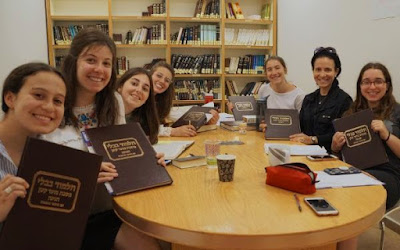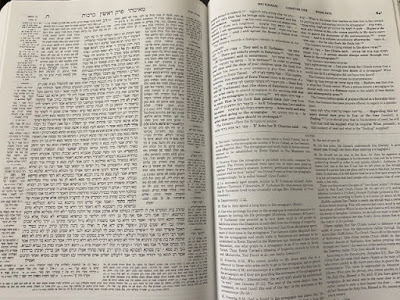 |
| Women and their volumes of Talmud (photo credit Nishmat: The Jeanie Schottenstein Center for Advanced Torah Study for Women) |
I got caught up in Daf Yomi fever.
For the past seven and a half years, I’ve watched my husband sit with a volume of the Talmud in his hands. I’ve cheered him when he announced that he was caught up to the day’s daf. And I was exceedingly impressed that, before the siyum, he pushed himself to make up the pages he missed learning while sitting shiva, first for his mother A”H and then for his father A”H a few years later.
I even agreed to attend a huge Siyum haShas in Jerusalem to help him mark his outstanding achievement. I so wanted to shep nachas, but that siyum turned out to be a huge disappointment. It started with the fact that I had to sit separately, in the balcony, cloistered away, with the other women, while an endless parade of men celebrated themselves for two hours, without acknowledging the possibility that a single Jewish woman had ever cracked the spine of a single mesechta.
I’m not gonna lie. The all-men-all-the-time program zapped a bit of my joy.
A few nights later, balance was restored in the universe after I read all the glowing reports of the Hadran, the Siyum haShas attended by 3,300 Jews, women and men together, celebrating women who completed the latest Daf Yomi cycle. I didn’t attend, which, in retrospect, I regret. I did watch clips and read many reports of how encouraging it was to see women’s Torah learning being celebrated at that level.
In the midst of all these Siyum haShas festivities, my book club began reading If All The Seas Were Ink, Ilana Kurshan’s memoir of healing from a painful divorce and building a new family, over the span of the Daf Yomi cycle.
Studying a page of gemara a day, consistently, for seven and a half years, is a pretty remarkable achievement. The fact that there were women just like me doing it made me consider, for the first time ever, learning Daf Yomi as well.
And so I did. I got the sefer off the shelf. I signed up for a women’s Daf Yomi podcast, joined a women’s Daf Yomi Facebook group and cracked the book open for myself.
 |
| One of the pages of Talmud I actually learned. |
Talmud is well-known for its meandering style. The rabbis transition from one topic to another with sometimes only the thinnest thread connecting the two. It was a pleasant reminder to me of an engaging Shabbat meal, where the conversation flows naturally from one topic to another.
It was pretty gratifying to be learning the same daf as my husband, for the short time it lasted. I gave it up rather quickly. I would like to emphasize that I didn’t give it up because I thought it was intellectually over my head.
I gave it up because I lack the imagination to transcend the blinding maleness of Talmud. I was braced for an assault on my gender every time I turned the page, because I knew it was coming. I just didn’t know from which direction. I knew enough Talmud to know that, to the Talmudic mind, throughout its 2,711 pages, women are profoundly "other".
I also quickly discovered that I really didn’t care about the hairs they were splitting, especially since each page I learned was, primarily, a minute dissection of a positive, time-bound mitzvah (reciting Shema twice a day) that doesn’t even apply to me as a woman and that speaks of mitzvot, like tzitzit and tefillin, that also don’t apply to me.
This kind of learning nurtures some women. I see from the enthusiasm and the increasing numbers of women investing themselves in learning gemara that it brings them something meaningful.
I couldn’t be more delighted for them.
But I see that my soul needs something else.
I admit I got caught up in the fervor, in the whole Daf Yomi fever. That’s what pushed me to try, when I’d never considered trying before.
But I realized very quickly that this is not the kind of learning I want to spend my time on. For me, I’m happiest learning about the different parts of the soul and where they come from, about gilgulim, about geula and Moshiach and chassidut and Tanach.
For some people, the kind of Torah that makes my soul sing strikes them as not serious or substantial enough to be considered Torah study. For some people, only gemara and halacha count.
This puzzled me until I learned a new understanding of a piece of gemara, ironically enough. In Tractate Niddah (30b) one finds the well-known legend that each fetus is taught the entire Torah while in utero. And just when the baby is born, an angel comes and taps the infant on the mouth. With that tap, the entire Torah is forgotten, according to the gemara.
I’ve always understood that this was done so that when a person learns Torah again, the echo of their prenatal learning makes it somehow familiar to them. And this story is also a source for explaining why we have an indentation between our nose and upper lip; that's where the angel touched us just before we were born.
But there’s more. In his sefer Even Shlayma, the Vilna Goan explains that each fetus does not learn the same approach to Torah. Some learn nigleh – revealed Torah. And later in life, those people are happiest studying Talmud and halacha.
Other are taught nistar – concealed Torah, namely kabbalah and chassidut. And for those people, Torah nurtures most when it’s connected to the mystical.
Both kinds of Torah are Torah. But not everyone is equally comfortable in both realms. For me, my soul vibrates with nistar.
This whole rapidly truncated experiment made me realize that the worldwide hype, all the press, all the attention to Daf Yomi and the Siyum haShas over the past few weeks is a celebration of nigleh. Which made it a bit like celebrating someone else’s birthday.
It’s a lovely party.
Just not mine.
How I look forward to the world celebrating, with as much attention, the Torah topics that sing to my soul.
I’ve been told that, in the Chabad world, Yud Tes Kislev is a celebration of the annual cycle of learning Tanya, a text I recently started to learn again, after failing to pierce its depth some years ago.
Maybe next year, I’ll celebrate with the Chabadnikim.
And I will finally feel at home.